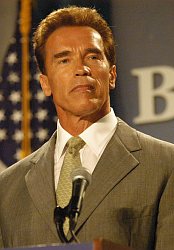The second-guessing and backseat driving has now hit epidemic proportions, as every pundit, political science professor, and columnist in the state has begun to explain exactly why the Schwarzenegger reform effort has failed. Nowhere has that criticism been more intense than among the ranks of Republican campaign consultants who are not affiliated with the governor’s committees. And while I have certainly not avoided the opportunities offered by an always-willing news media to offer my thoughts as well, at least today it may make sense to worry less about what has happened and begin to think about what comes next.
 I have previously written that Schwarzenegger can plausibly claim victory if he passes either Proposition 77 or 75, on the grounds that he will be able to argue that at least he has opened the door for further reform by achieving either the redistricting reform or paycheck protection that those two initiatives offer. If one or the other passes, there’s a good chance he pulls Prop 74 across the finish line as well, finishing with a split decision of two out of four.
I have previously written that Schwarzenegger can plausibly claim victory if he passes either Proposition 77 or 75, on the grounds that he will be able to argue that at least he has opened the door for further reform by achieving either the redistricting reform or paycheck protection that those two initiatives offer. If one or the other passes, there’s a good chance he pulls Prop 74 across the finish line as well, finishing with a split decision of two out of four.
Regardless of today’s outcome, though, a strong case can be made that Schwarzenegger is still the odds-on favorite for re-election next year. Each of the state’s major public opinion polls shows that voters are disinclined to re-elect him next year by wide margins when asked the question in the abstract. But when Schwarzenegger is matched against either of the two likely Democratic candidates, he is currently only running a few points behind both Phil Angelides and Steve Westly. The dichotomy in these two sets of results points toward the path of an Arnold re-election.
When voters are asked if they are inclined to re-elect a governor (or a President, a mayor, or any other incumbent), they tend to imagine an idealized alternative. In other words, if Schwarzenegger ran against Abraham Lincoln or Theodore Roosevelt, most Californians would vote against him. But a campaign against Angelides or Westly is a much more achievable goal, and when voters judge Schwarzenegger in the context of a comparison against another living, breathing, talking politician, they’re likely to assess him more favorably.
When my former boss Pete Wilson was one year away from his own re-election campaign, he faced similar levels of voter dissatisfaction. Schwarzenegger’s overall approval ratings, as well as the number of voters inclined to re-elect him, are very similar to those Wilson faced in 1993. But while Wilson was also running 20-25 points behind his probable opponent, state Treasurer Kathleen Brown, the polls show Schwarzenegger barely outside the margin of error against his most likely Democratic foes.
In other words, this is as bad as its going to get for Schwarzenegger. And if the leading Democrats aren’t showing more strength against him at this low point, re-election begins looking much more likely even for a governor whose special election didn’t turn out the way he wanted.

